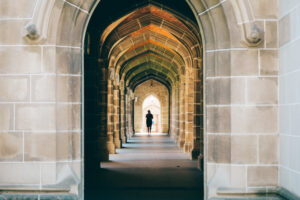Humanities and the challenge of totalitarianism
Humanities and the challenge of totalitarianism
The humanities not only face significant opposition from totalitarianism, but also offer one of the most substantial challenges to totalitarianism. This makes the survival of humanities critical to the survival of a free society.
This article was written in preparation for our round table on ‘End of Humanity(s)?’
The Central European University (CEU) is a private research university known for its strength in the humanities as well as the social sciences.[1] Funded by an endowment from George Soros, the central tenet of the CEU was the promotion of ‘open societies’.[2] Only months after Harvard academic Michael Ignatieff became the fifth president and rector of the CEU on 5 May 2016, the Hungarian government challenged the university’s legal right to continue to operate in Hungary.[3] Ignatieff and the CEU saw the challenge not only as Prime Minister Viktor Orbán’s vendetta against Soros himself, but as part of a much wider authoritarian attack by Hungary’s conservative right against democratic ideals.[4] On 3 December 2018, the CEU announced its departure from Budapest, relocating to Vienna.[5]
The CEU vs. Hungary
The Hungarian government’s shutdown of the CEU triggered a wave of protest and solidarity from academics and politicians worldwide. On 6 October 2020, in a case brought by the European Commission, the European Court of Justice, Europe’s highest court, ruled that the shutdown not only violated Hungary’s commitments under the WTO, but also the Charter of Fundamental Rights of the European Union “relating to academic freedom, the freedom to found higher education institutions and the freedom to conduct a business.”[6] Ignatieff supported the ruling as a landmark for “the cause of academic freedom and institutional autonomy in Europe.”[7] The case of the CEU vs. Hungary represents a present-day iteration of the long challenge the humanities have faced from totalitarianism. Orbán’s government has been described as an ‘illiberal democracy’: despite competitive elections, the government has – in the words of Ignatieff himself – “perfected a system of control in which people have enough private freedom so that it prevents them demanding public freedom.”[8] Not identical to the totalitarian regimes of the 50s and 60s, it still delivers comparable state interventions that reduce political freedom significantly enough to end pluralism in society and politics.[9]
Free minds for free society
But why do the humanities face opposition from totalitarianism? While totalitarianism can be understood as “the principle of government according to which all institutional and private arrangements are subject to control by the state,”[10] the humanities represent the “subjects and disciplines dedicated to the study of humanity and its creations, such as fine art, philosophy, history, languages, drama, literature, and music.”[11] Many argue that the humanities, with their scrutiny of what is understood to be true, are a precondition to political freedom. Only free minds can build a free society. In a speech, An education for freedom, A. Bartlett Giamatti, president of Yale University from 1978 to 1986, elaborated this claim, “the best way . . . to combat indoctrination by any system that would exclude or master others as slaves is to promote a view of education that is not intended to indoctrinate. Such an education would constantly test, rather than impose, the values it cherishes and would posit seeking the truth — not simply propounding the truth — as its goal. Such an education is a process, not a closed and static system of beliefs, and its goal is to free the mind rather than enclose it.”[12] Giamatti concluded that “at the heart of the humanities lives the conviction that freedom of thought is the necessary precondition to political freedom.”[13] It can be argued, therefore, that the humanities are necessary to the work of leaders and citizens in democratic societies. It offers them the values and capacity “to discuss, negotiate and compromise — that is, to employ the tolls of democracy.”[14] As Ronald J. Daniels, the president of Johns Hopkins University, elaborates in Don’t Underestimate The Value Of Humanities, the humanities provide opportunities for students to learn critical thinking, self-reflection, creativity, empathy, tolerance, and communication skills — qualities that are useful in the full spectrum of one’s life, including professional, personal, and civic pursuits.[15] These qualities, as American philosopher Martha Nussbaum highlights, also prompt people to develop qualities associated with responsible citizenship.[16]
In addition to fostering a free society, the humanities have also offered direct resistance to totalitarianism. This has been most strongly felt in Europe and North America with the works of the German-born American political theorist Hannah Arendt and the German Frankfurt School. Arendt’s arguments about the ordinariness of totalitarianism, with her accounts of commonplace obedience[17] and organised loneliness,[18] have functioned as profound reminders of society’s susceptibility to totalitarianism. Her arguments, for example, amply warn us that the rise of right-wing populism in Europe and the United States may lead to new forms of authoritarianism. Her works have also represented an ongoing project for freedom. While arguing for art as political in The Crisis in Culture, for example, Arendt argued that art’s freedom requires other freedoms to also exist, such as freedom for a diversity of perspectives within public life.[19] The Frankfurt School also yielded influential critiques of totalitarianism, which as Raffaele Laudani reminds us in Secret Reports on Nazi Germany: The Frankfurt School Contribution to the War Effort, helped set out proposals for effective struggle against German fascism.[20] Herbert Marcuse’s subsequent critique of capitalism’s increasing control of all aspects of social life arguably both extended the Frankfurt School’s resistance to totalitarianism and further reinforced Arendt’s case for the ordinariness of totalitarianism. Jürgen Habermas’s Frankfurt School efforts also further opened up the intervention of the humanities into the rethinking of political life in postwar Europe. Habermas, like Arendt, advocated for post-national forms of political community to overcome the totalitarian and violent legacy of nationalism.[21]
Studying God in the midst of totalitarianism
What can we say about the specific case of the study of theology and religion in a totalitarian setting? Can the study of theology and religion survive totalitarianism? Broadly speaking, it can be argued that intervention of the state in institutional and private arrangements deeply undermines the independent place of religion in society. Eric Voegelin, for example, claimed that politics substitutes religion with the concept of politischen Religionen or ‘political religion’, which he invented to describe totalitarian regimes. In effect, he showed that totalitarianism seeks to take over religion’s “relationship between mankind and the sacred in one form or another”[22] in order to deliver its transformational politics. The resulting contest between religion and totalitarianism was palpable in postwar Poland, where the Roman Catholic Church became a source of opposition to the communist authorities. Less than a year after the fall of the communist order in Poland, the Church moved to exert considerable pressure on the government to re-establish religious education in the country.[23]
Notwithstanding this, the study of theology and religion has suffered whether there has been totalitarianism or not. It has been at the hands of religious institutions themselves. The late Hans Küng, controversial Swiss Catholic theologian and president of the Global Ethic Foundation, had his ‘missio canonica’, the license needed to teach Roman Catholic theology, withdrawn by the Church in 1979.[24] He was never able to teach as a Catholic theologian at Catholic universities. Both Küng’s treatment and his post-Nietzschean theology highlight the challenge intellectual freedom faced from the Church, and spurred him to question whether “this Pope [Pope John Paul II] from a country [Poland] with a totalitarian regime, with a closed authoritarian church, will in all instances be a guarantor of freedom and openness in our church.”[25] On an American lecture tour in 1983, he went even further to compare Catholicism to communism. “Are not both,” he asked, “absolutist, centralist, totalitarian, in short, enemies of human freedom?”[26] Notwithstanding his controversial positions, Küng’s case illustrates how the study of theology and religion needs freedom to survive, if not flourish.
Another threat to the study of theology and religion is the commercialisation of education. In the UK, the study of theology and religion is at significant risk of “disappearing from our universities.”[27] The British Academy reported a sharp decline in student numbers, with about 6,500 fewer students on such degree courses in 2017-18 than six years ago, when fees by the Conservative Government were increased. This decline has since led to the closure of several university theology departments as well as the UK’s specialist theological institution, Heythrop College, which was founded in 1614. Professor Roger Kain FBA, Vice-President of Research and Higher Education Policy at the British Academy, said: “This report comes at a critical time for Theology and Religious Studies. Not only are the subjects’ popularity on the wane but the problem is confounded by the profile of their teaching staff; if more ethnically and gender diverse groups do not rise through the ranks, there is a danger that these highly relevant disciplines disappear from our universities.”[28]
The humanities as anti-totalitarian
The disappearance of university theology departments in the UK is a concerning development, particularly in the context of rising religious extremism which variously shares the totalist features of 20th-century totalitarianism. Sir Diarmaid MacCulloch FBA, Professor of the History of the Church at the University of Oxford, highlights why this matters: “Despite the rise of secularism in the West, religion continues to play a dominant role in the world stage. Religious extremism, religion-infused nationalism, and tension between religious communities are just some of the many challenges we face today. Religion is more, not less, relevant than ever before, and the study of it should reflect this. As an academic community, we must strive to ensure that our Theology and Religious Studies reflect the world they seek to explain.”[29] So while the humanities, and within it the study of theology and religion, do struggle to survive in totalitarian settings, it is also important to note that the humanities are a potentially powerful source of opposition and critique against totalitarian politics. To return to Küng’s theology, “all spiritual and cultural traditions at their best are healthily anti-totalitarian.”[30] Maintaining the humanities may be the best chance we may have against totalitarianism.
Our team of analysts conducts research on topics relating to religion and society. In the past month, the topics of traditions, tension, corona, and leadership were trending. Find out their relationships on the EARS Dashboard.
Sources
[1] The CEU is one of eight members comprising the CIVICA Alliance, a group of European higher education institutions in the social sciences, humanities, business management and public policy, such as Sciences Po (France), The London School of Economics and Political Science (UK), and the Stockholm School of Economics (Sweden).
[2] Central European University (CEU) | University Info
[3] Liberal Hungarian university warns Viktor Orbán could force it abroad
[4] Europe’s future hangs in balance, says head of a Budapest university
[5] CEU Forced Out of Budapest: To Launch US Degree Programs in Vienna in September 2019
[6] “Landmark Judgment” – Lex CEU Struck Down by European Court of Justice
[7] “Landmark Judgment” – Lex CEU Struck Down by European Court of Justice
[8] Michael Ignatieff on the Challenge of Illiberal Democracy and Capitalist Authoritarianism
[9] Michael Ignatieff on the Challenge of Illiberal Democracy and Capitalist Authoritarianism
[12] Humanities Foster Freedom
[13] Humanities Foster Freedom
[14] Humanities Foster Freedom
[15] Don’t Underestimate The Value Of Humanities
[16] Not for Profit: Why Democracy Needs the Humanities – Updated Edition
[17] Arendt, H. (1963). Eichmann in Jerusalem : A report on the banality of evil (Power and Morality Collection at Harvard Business School). New York: Viking Press.
[18] Arendt, H. (1958). The origins of totalitarianism (2d enl. ed.] ed., Meridian books ; MG15). New York: Meridian Books.
[19] Arendt, H. (1968). Between past and future : Eight exercises in political thought (Enl. ed.] ed.). New York: Viking Press.
[20] Neumann, Franz, Marcuse, Herbert, Kirchheimer, Otto, & Laudani, Raffaele. (2013). Secret reports on Nazi Germany. Princeton: Princeton University Press.
[21] Verovšek PJ. Integration after totalitarianism: Arendt and Habermas on the postwar imperatives of memory. Journal of International Political Theory. 2020;16(1):2-24.
[22] From “Political Theology” to “Political Religion”: Eric Voegelin and Carl Schmitt1 | The Review of Politics | Cambridge Core
[23] The Roman Catholic Church and Democracy in Poland
[24] Swiss-born Father Hans Küng, theologian, dies at 93
[25] Pope John Paul II: His First Year
[26] Hans Küng, Catholic theologian who challenged papal authority, dies at 93
[27] Theology and Religious Studies risk disappearing from our universities, says the British Academy
[28] Theology and Religious Studies risk disappearing from our universities, says the British Academy
[29] Theology and Religious Studies risk disappearing from our universities, says the British Academy






